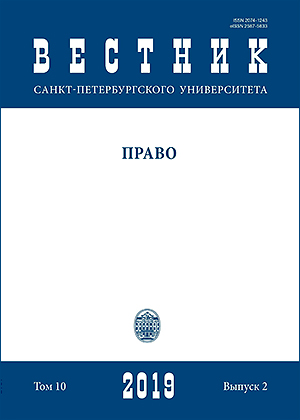Rights and interests of children in the information sphere: improvement of legislation
DOI:
https://doi.org/10.21638/spbu14.2019.211Abstract
The paper analyzes the effectiveness of legal counteraction to the negative psychological impact to minors from information and telecommunication networks. Information and telecommunication networks have a growing impact on children that is aimed to have a destructive influence on their psyches to arouse negative thoughts and experiences and to blur traditional Russian spiritual and moral values. The number of risks that may cause children to fall under the negative influence of information from the internet is constantly increasing. It is also facilitated by the rapid development of technology. Currently, domestic legislation is not yet able to adequately counteract this phenomenon. Due to age peculiarities, children are deprived of the opportunity to critically evaluate information received through information and telecommunication networks and thus risk being in an unsafe environment. The hazards of interaction with information of this kind can cause negative consequences for the child’s physical and mental state. The types of information harmful to the health and (or) development of children as specified in Federal Law No. 436-FZ “On protecting children from information harmful to their health and development” does not currently meet needs of modern society and requires adjustment. Changes in the list must be made to restrict access to harmful information more effectively and to ensure the information security of minors. In addition, another important task is the development of legal definitions for several basic concepts of this law. Improving lawmaking activity will minimize negative factors associated with children’s interaction with information and telecommunications networks, including the internet.
Keywords:
minors, Internet, informational rights, information society, informational offenses, improvement of legislation
Downloads
References
Downloads
Published
How to Cite
Issue
Section
License
Articles of "Vestnik of Saint Petersburg University. Law" are open access distributed under the terms of the License Agreement with Saint Petersburg State University, which permits to the authors unrestricted distribution and self-archiving free of charge.






